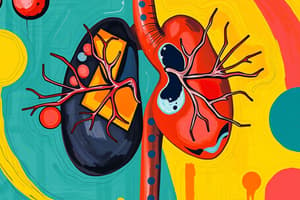Podcast
Questions and Answers
What is the active metabolite of Isosorbide mononitrate?
What is the active metabolite of Isosorbide mononitrate?
- Nitroglycerin
- GMN
- GDN (correct)
- Isosorbide dinitrate
Why should Isosorbide dinitrate sublingual tablets be taken sitting down?
Why should Isosorbide dinitrate sublingual tablets be taken sitting down?
- To prevent reflex tachycardia
- To accelerate the onset of action
- To reduce the risk of headache
- To avoid postural hypotension (correct)
How should nitroglycerine patches be used to prevent tolerance?
How should nitroglycerine patches be used to prevent tolerance?
- Change them every hour
- Apply them continuously without breaks
- Apply them for 12 hours on and 12 hours off (correct)
- Use them only during the day
Which type of angina would benefit from intravenous GTN administration?
Which type of angina would benefit from intravenous GTN administration?
What is the mechanism of action of nitrates like Isosorbide dinitrate?
What is the mechanism of action of nitrates like Isosorbide dinitrate?
What is a common adverse effect associated with organic nitrates?
What is a common adverse effect associated with organic nitrates?
What is the primary pharmacological effect of organic nitrates in the treatment of angina?
What is the primary pharmacological effect of organic nitrates in the treatment of angina?
At high/excessive doses of organic nitrates, what physiological response can partially offset the beneficial effects on the oxygen supply/demand ratio?
At high/excessive doses of organic nitrates, what physiological response can partially offset the beneficial effects on the oxygen supply/demand ratio?
Which of the following is a short-acting nitrate used in the treatment of angina?
Which of the following is a short-acting nitrate used in the treatment of angina?
What is the bioavailability of Isosorbide dinitrate when administered sublingually?
What is the bioavailability of Isosorbide dinitrate when administered sublingually?
Which of the following is a true statement regarding the duration of action of nitroglycerin?
Which of the following is a true statement regarding the duration of action of nitroglycerin?
What is the onset time for nitroglycerin when administered sublingually?
What is the onset time for nitroglycerin when administered sublingually?
Which side effect is commonly associated with the use of nitrates?
Which side effect is commonly associated with the use of nitrates?
What is the role of short-acting nitrates in the treatment of angina?
What is the role of short-acting nitrates in the treatment of angina?
Which of the following is an example of a short-acting nitrate used in angina management?
Which of the following is an example of a short-acting nitrate used in angina management?
When should a person with stable angina use short-acting nitrates before planned exercise or exertion?
When should a person with stable angina use short-acting nitrates before planned exercise or exertion?
What is the main mechanism of action of organic nitrates in the treatment of angina?
What is the main mechanism of action of organic nitrates in the treatment of angina?
Flashcards are hidden until you start studying
Study Notes
Pharmacokinetics of Organic Nitrates
- Isosorbide dinitrate sublingual: t50 = 1hr, onset = 2-5 min
- Isosorbide dinitrate oral: t50 = 2-4 hrs, onset = 15-40 min
- Isosorbide mononitrate oral: t50 = 4-6 hrs, onset = 1hr
- Nitroglycerin sublingual: t50 = 1-4 min, onset = 1-3 min
Clinical Use of Organic Nitrates
- Relief of angina attack
- Prevention of angina: regular use, before exertion
- Unstable angina: intravenous GTN
- Acute heart failure: next unit
- Chronic heart failure: next unit
Tolerance and Nitrate-Free Holiday
- Blood vessels desensitization to vasodilation with prolonged use
- Recommended: nitrate-free holiday at night, nitroglycerine patches 12 hours on and 12 hours off
Adverse Effects and Cautions
- Headache
- Postural hypotension
- Reflex tachycardia
- Facial flushing
- "Monday disease"
Pharmacological Effects
- Vasodilation: venous dilation (high), arterial dilation (smaller/moderate), coronary dilation (minimal)
- Decreased preload and cardiac workload
- Reduced ventricular wall stress
- At high doses: effect on baroreceptor reflex, producing tachycardia
Duration of Action
- Short-acting nitrates: nitroglycerin sublingual, isosorbide dinitrate sublingual, amyl nitrate inhalation
- Long-acting nitrates: nitroglycerin oral, isosorbide dinitrate oral, isosorbide mononitrate oral
Management of Angina
- Role of each agent in management of myocardial infarction
- Possible side effects and management
- Exercise: three available oral formulations of organic nitrates
Pharmacy Considerations
- Angina: advising patients on administration and side effects of short-acting nitrates
- Maximum number of repeat doses when treating an episode
- Time to wait for response before seeking medical attention
- Individualization of therapy for prophylaxis in stable angina
Studying That Suits You
Use AI to generate personalized quizzes and flashcards to suit your learning preferences.




